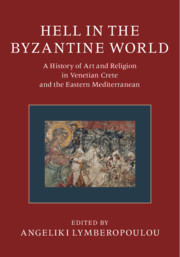 Hell in the Byzantine World
Hell in the Byzantine World from Part I - Crete
Published online by Cambridge University Press: 02 October 2021
Dionysios Stathakopoulos’ chapter is divided in two parts. In the first he presents the textual sources that have had a seminal influence on the establishment of a visual vocabulary of transgressions that appear in depictions of Hell in monumental painting. He focuses on the development of ideas of punishment in the afterlife, tracing their origins from the Old and the New Testament and apocryphal texts to late Byzantine theology, which were popular in shaping ideas on punishment. Since, however, they do not always assist our understanding of the iconography of Hell, as this also reflects the social preoccupations of the community that commissioned the cycles, Stathakopoulos, in the second part of his chapter, turns to Joseph Bryennios (born around 1350), who recorded a vivid depiction of his experiences during his appointment on Crete, in an attempt to look into the contemporary society that commissioned the Cretan Hell cycles that lie at the heart of this publication.
To save this book to your Kindle, first ensure no-reply@cambridge.org is added to your Approved Personal Document E-mail List under your Personal Document Settings on the Manage Your Content and Devices page of your Amazon account. Then enter the ‘name’ part of your Kindle email address below. Find out more about saving to your Kindle.
Note you can select to save to either the @free.kindle.com or @kindle.com variations. ‘@free.kindle.com’ emails are free but can only be saved to your device when it is connected to wi-fi. ‘@kindle.com’ emails can be delivered even when you are not connected to wi-fi, but note that service fees apply.
Find out more about the Kindle Personal Document Service.
To save content items to your account, please confirm that you agree to abide by our usage policies. If this is the first time you use this feature, you will be asked to authorise Cambridge Core to connect with your account. Find out more about saving content to Dropbox.
To save content items to your account, please confirm that you agree to abide by our usage policies. If this is the first time you use this feature, you will be asked to authorise Cambridge Core to connect with your account. Find out more about saving content to Google Drive.